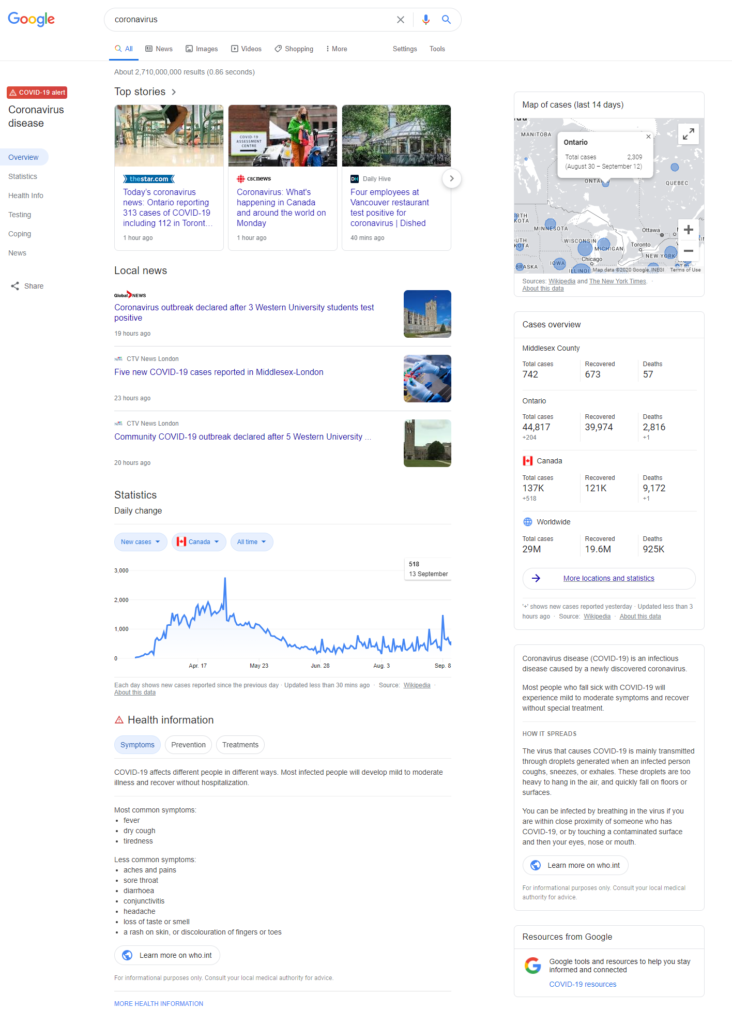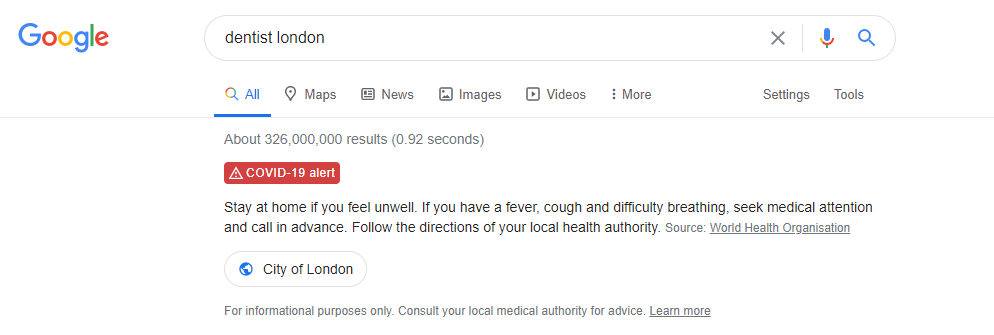This is an archived article and contains information that has not been updated or reviewed since it was originally published. For more information regarding the content in this article, please contact us.
It is no secret that our daily lives have changed since the impact of COVID-19 has been felt globally. The way we work and live has changed, and with that, so has digital marketing and the way we approach business.
Search engine optimization is something our clients rely on so that their business can be found when someone needs it. It’s our role as our clients’ marketing partner to stay up to date on algorithm updates and new features in the SERP (Search Engine Results Page). As we navigate Google daily to adapt to ever-changing algorithms, we are constantly modifying our strategies to accommodate new advancements in the way Google serves content to its users.
Since we last reported on the anatomy of the SERP in early February, Google has released some of its most revolutionary features that will impact the SERP forever. The new features came about due to the COVID-19 pandemic, but the result of these changes will impact Google’s approach to algorithms for years to come.
Here is a look at some of Google’s SERP updates and what the future of Google’s experience may look like.
Coronavirus Updates to the SERP
Google is where most of the world’s population choose to get their information. With the COVID-19 outbreak, Google has the responsibility to ensure that disinformation has no place on the first page. Searching “coronavirus” + keyword variants presents a completely different SERP than ever seen before:

The first page results in the SERP prioritizes data, symptoms, and case statistics before the list of top results appear, which are at the very bottom of the page. The simplicity in the overview makes this update like nothing Google has ever released.
Sticky Menu
The new sticky menu on the left side of the SERP is a feature that assists users in finding the information relevant to them without having to scroll. It breaks down the data available into multiple categories, so users do not have to search these separately.
Infographics
With all the data Google must sift through in relation to the pandemic, it has prioritized the use of infographics to relay important case information and statistics to users. The infographics allow users to easily see and understand the data being presented and avoids miscommunication or confusion.

Authority Over Everything
Google has long been fighting the good fight against disinformation. Last year, Google released a paper explaining the steps they take against disinformation, which ultimately impacts their mission of organizing information and making it available to users.
To reduce the visibility of misleading or inaccurate content, Google has continually designed its algorithms to prefer authority over factors like recency or exact word matches while a crisis is developing.
Although Google has always placed value on credibility and authoritativeness of a website, it has become more apparent with the rise of the COVID-19 pandemic. On June 22nd, Google released an update that brought this mission to life by increasing SEO visibility amongst government and health websites, with visibility metrics increasing in some cases by over 100%.
Take “hand sanitizer”, for example – before the June update, we could see the SERP was dominated with listings from Walmart and Amazon and other larger players. Now, Canada.ca takes the #1 organic position with a list of hand sanitizers authorized by Health Canada.

How Will Google Updates Impact Other Businesses?
These updates specific to COVID-19 are impacting thousands of keywords, not just coronavirus related queries. When searching for a dentist in London, you will be served a COVID-19 alert urging users to stay home if you are sick:

Even if you are not a health-related organization, you can expect these updates to cause shifts across the board. For example, when searching “get a college diploma” or “earn a degree”, the SERP is mainly dominated by ads and organic listings for online courses.
As people around the globe shift the way they work and live, this is only the tip of the iceberg for what we can expect to happen on Google. What people want and need has changed dramatically, and so too has their online behaviour. Indirectly COVID-19 has impacted search results across nearly every vertical; so your website visibility may have shifted as a result.
How to Reduce the Impact on Your Business with Good SEO
They say if you can’t beat ‘em, join ‘em, and that is exactly the case when it comes to changes in the way we work, live and search online. You will never be able to outsmart Google, and that’s not what SEO and digital marketing are about.
Google will always favour what they call “E-A-T” – Expertise, Authority and Trustworthiness. To put it simply – you will never be able to outrank a government website for your core keywords. Besides, it is highly unlikely your website would provide more value than governing bodies (sorry not sorry).
What you can do is identify where your business does provide more value and authority than your competitors and concentrate there.
It’s time to get real – which topics is your business actually an expert on?
Make sure you’ve covered the basics of a solid SEO strategy or else you’ll risk putting the horse before the cart. To be clear – when we say “SEO Strategy” we mean a 2020 proof SEO plan that goes farther than just optimizing page titles and meta descriptions. If you’ve got that covered, dive into these tips:
1. Analyze Google Trends
Google Trends is a highly underrated tool that allows you to search for trending and breakout topics in relation to your business. You can start testing out Google Trends by using a generic term that your website is an authority on. You can export this list of queries and drill down on specific topics that are relevant to your business.
Pro tip: Pay close attention to rising or “breakout” topics which can be a source of quality and original content for your business.

2. Trend & Topic Related Keyword Research
Like Google Trends, leverage keyword research to analyze related keywords to your business. SEO’s are typically obsessed with search volume, which is unarguably a vital metric, but there should also be a focus on how keyword topics are trending. At Ontario SEO, we leverage several tools to dive into how your keywords stack up in terms of search volume and trends:

3. Analyze Topics That You Already Rank For
Now that you have an idea of trending keywords related to your business and their average search volume, it’s time to dive into Google Search Console to find the keywords that your website is appearing for in the SERP, but isn’t necessarily targeting. It’s a great tool to find long-tailed queries that could be missed opportunities for your business.
4. Find Out What’s Trending on Social Media
There are hundreds of tools out there to find out what content is trending on social media. Check what’s trending within the last week or month to determine potential topics for content creation. Don’t underestimate the power of social media – these platforms can provide as much data as monthly search volume.
5. Look for Patterns in The Data for Content Ideas
You’ve just compiled what probably feels like more data than you know what to do with. Now it is time to consolidate and compare the data. The goal is to find common themes and patterns to develop targeted content for the keyword variants you have identified.
6. Stalk Your Competition
Now that you have an arsenal of content creation ideas, it’s time to find out how the competition stacks up. Check out the SERP to find opportunities where you can easily create content that delivers more value than what they’re ranking for.
7. Provide Value with New Content
You can’t just create a mishmash of content and expect it to rank if it doesn’t offer value to potential customers. Make sure that you establish the credibility required so you have an opportunity to rank for these topics.
Google Makes Mistakes, Too
User behaviour is both a science and an art. To marry the two is the job of an SEO agency. Don’t underestimate the power of Google, but know that Google does make mistakes, and there will be times that you’ll be banging your head against a wall wondering how a competitor outranks you.
You are bound to see ranking fluctuations as you push the boundaries with new topic and content development, but patience is a virtue – in the end, the best website wins.
We’ll Stay on Top of it, So You Don’t Have to
All we do every day is help businesses get Google’s algorithms working in their favour. We do this with data-driven strategies that drive growth year over year (over year). If you aren’t sure how to create content your users will find and value, leave the tough stuff to us.
Not sure how to create content your users will find and value? Leave the tough stuff to us.


